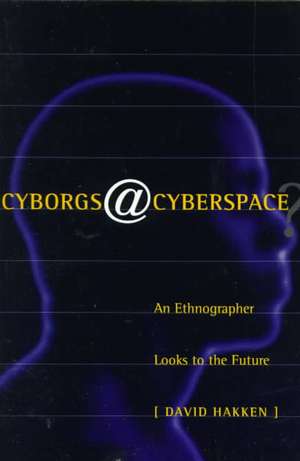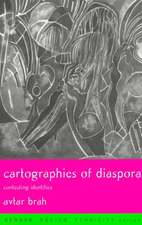Cyborgs@Cyberspace?: An Ethnographer Looks to the Future
Autor David Hakkenen Limba Engleză Paperback – 16 mar 1999
Preț: 355.90 lei
Nou
Puncte Express: 534
Preț estimativ în valută:
68.10€ • 72.82$ • 56.78£
68.10€ • 72.82$ • 56.78£
Carte tipărită la comandă
Livrare economică 17 aprilie-01 mai
Preluare comenzi: 021 569.72.76
Specificații
ISBN-13: 9780415915595
ISBN-10: 0415915597
Pagini: 276
Dimensiuni: 152 x 229 x 19 mm
Greutate: 0.44 kg
Ediția:1
Editura: Taylor & Francis
Colecția Routledge
Locul publicării:Oxford, United Kingdom
ISBN-10: 0415915597
Pagini: 276
Dimensiuni: 152 x 229 x 19 mm
Greutate: 0.44 kg
Ediția:1
Editura: Taylor & Francis
Colecția Routledge
Locul publicării:Oxford, United Kingdom
Notă biografică
David Hakken is Professor of Anthropology and Director of the Policy Center at the SUNY Institute of Technology. He is principal author of Computing Myths, Class Realities (1993) and has written numerous journal articles on work, technology and social change.
Recenzii
"A path-breaking work in anthropology and social theory, Hakken's study of our emerging online culture offers new ways of understanding human identities and interactions. Richly documented and powerfully argued, the book's provocative exploration moves beyond all the shabby platitudes about computers and society, placing the debate about cyberspace--its promise and pitfalls--on more solid foundations." -- Langdon Winner, author of The Whale and the Reactor
"Challenging the pervasive image of a computer revolution, Hakken insightfully demonstrates that information technology is better viewed as a new terrain of contestation than an ineluctable force. What's important is how the technology is perceived and which potentials people actually appropriate. Hakken's great strength lies in using interesting examples to map continuities in broader networks of social relations. He builds these into a sustained effort to reinvigorate general anthropology, uniquely extending the cyborg metaphor to link biological with cultural perspectives and treat technology and humanity in a unified frame." -- Gary Downey, author of The Machine in Me, Routledge, 1998
"Hakken combines his unique ethnographies of computing cultures in England, Norway, and Sweden with his long term involvement in theoretical and political discussions of advanced information technologies. In an impressive tour de force, he develops a rich anthropological account of possible meanings of cyberspace that confront the usual stereotypes." -- Randi Markussen, Aarhus University, Denmark
"Hakken remains an ethnographer grounding his understandings in the acts, statements, and opinions of real people in real settings. He is particularly good at puncturing technology-based visions that ignore social, cultural, political, and/or economic factors that do matter." -- -Gregory Finnegan, Harvard University
"This text offers a fascinating reflection on anthropological research on computing and social change." -- Ergonomics Abstracts, 2001, Volume 33, Number 3
"The author is passionate about his subject. He presents his thesis in a penetrating and incisive style and his argument is carefully crafted and eloquent...this thought provoking and compelling text draws our attention to powerful social and cultural change which is taking place in a random fashion mediated by this comparatively little monitored or explored arena." -- Ergonomics Abstracts, 2001, Volume 33, Number 3
"Challenging the pervasive image of a computer revolution, Hakken insightfully demonstrates that information technology is better viewed as a new terrain of contestation than an ineluctable force. What's important is how the technology is perceived and which potentials people actually appropriate. Hakken's great strength lies in using interesting examples to map continuities in broader networks of social relations. He builds these into a sustained effort to reinvigorate general anthropology, uniquely extending the cyborg metaphor to link biological with cultural perspectives and treat technology and humanity in a unified frame." -- Gary Downey, author of The Machine in Me, Routledge, 1998
"Hakken combines his unique ethnographies of computing cultures in England, Norway, and Sweden with his long term involvement in theoretical and political discussions of advanced information technologies. In an impressive tour de force, he develops a rich anthropological account of possible meanings of cyberspace that confront the usual stereotypes." -- Randi Markussen, Aarhus University, Denmark
"Hakken remains an ethnographer grounding his understandings in the acts, statements, and opinions of real people in real settings. He is particularly good at puncturing technology-based visions that ignore social, cultural, political, and/or economic factors that do matter." -- -Gregory Finnegan, Harvard University
"This text offers a fascinating reflection on anthropological research on computing and social change." -- Ergonomics Abstracts, 2001, Volume 33, Number 3
"The author is passionate about his subject. He presents his thesis in a penetrating and incisive style and his argument is carefully crafted and eloquent...this thought provoking and compelling text draws our attention to powerful social and cultural change which is taking place in a random fashion mediated by this comparatively little monitored or explored arena." -- Ergonomics Abstracts, 2001, Volume 33, Number 3
Cuprins
Acknowledgments, I Introduction 2 An Alternative to “Computer Revolution” Thought Has There Been a Computer Revolution? 3 Doing Ethnography in Cyberspace 4 The Entity Problem: What Carries Culture in Cyberspace? 5 The Ethnography of Mid-Range Social Relations in Cyberspace: Community, Region, Organization, and Civil Society 6 Macro-Social Relations and Structure in Cyberspace 7 Knowledge in Cyberspace and the Practice of Ethnography 8 Conclusions


















